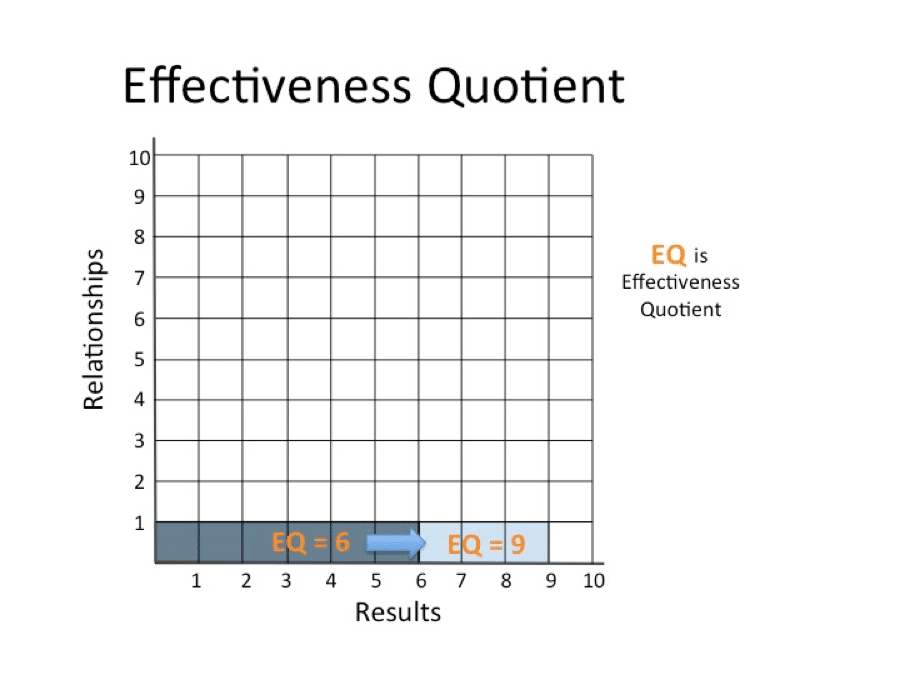A Simple Way to Measure Your Leadership Effectiveness

As the years went by, I learned to hire people who complimented and completed me and who were better than I was at driving for results and managing the things of the business. My strength was enhancing relationships and leading the people.
I knew our leadership team was better at the technical job skills training than I was. And I began to understand that I was stronger at developing our people which I really enjoyed doing.
ON/IN
Recently, I've been writing about the ON/IN principle that encourages us to
Work ON the business while we work IN the business.
- Bobby Albert
So, what is working ON, not just IN, the business? It involves a three-part growth strategy:
- Grow yourself
- Grow your people
- Grow your business
Every leader can boost their effectiveness by both enhancing relationships (developing people) AND driving for results (training job skills).
As I began to develop my leadership, I discovered an important truth: every leader can experience exponential effectiveness by employing the two "R" factors--as you drive for results, also maintain and enhance relationships.
The Effectiveness Quotient
I coined this term to describe or rate a person's level of effectiveness. Imagine if you were to rate a person on a scale from 1 to 10 regarding his or her focus and drive as these qualities related to results.
You would also rate the person from 1 to 10 on focus and intention as related to building and maintaining relationships.
This person's effectiveness quotient would be the "results rating" times the "relationship rating." So, a person with a results rating of six and a relationship rating of three would have an Effectiveness Quotient of eighteen.
Most managers have a bent or bias to drive for results (managing things). Concerning the Effectiveness Quotient graph below, I have found that it's not unusual for people to rate pretty well on results and fairly low on the relationships part of leadership.
 Look at the lower-left rectangle on the graph above. It represents the effectiveness of someone who reaches a six on the results scale (about average) and a one on the relationship scale (very low).
Look at the lower-left rectangle on the graph above. It represents the effectiveness of someone who reaches a six on the results scale (about average) and a one on the relationship scale (very low).
This person would focus on the bottom line and the end results of his or her work. Also, it's fair to say that he or she probably doesn't care much about building and enhancing relationships.
Even for those whose effectiveness is represented by the smallest shaded area on the graph, hope is not lost. They have some options to increase their level of effectiveness.
Focus on Results
The first option is to work diligently to increase the drive for more results and excellence. The goal would be to raise that six to a nine.
If this person worked individually and drove others with great intensity to achieve this, his or her Effectiveness Quotient would have increased by only 50 percent, and there would probably be "dead bodies" lying around.
There'd be better results, but at the expense of the majority of this person's relationships--both professional and personal.
Emphasize Relationships
The second option is for this person to strive to increase his or her people skills and level of relationships.
You might be thinking, "Bobby, if I take time to focus on people and relationships in my business, won't my results suffer?" That's a good question! I have learned that it is not an either-or situation. Let's look at the second Effectiveness Quotient graph.
 Suppose the leader now raises his or her relationship skills from one to five. In my experience and observations, the level of the leader's results will also increase, possibly from six to seven, with no added intentional effort in that area.
Suppose the leader now raises his or her relationship skills from one to five. In my experience and observations, the level of the leader's results will also increase, possibly from six to seven, with no added intentional effort in that area.
The total Effectiveness Quotient will now be 35. The leader will have exponentially increased his or her original effectiveness of six by 583 percent simply focusing on the relationship part of leadership.
The truth is that when leaders learn the skills to develop and emphasize both relationships AND results, their effectiveness is multiplied, not just added.
Even if it requires extra effort and time, even if it takes you out of your comfort zone, the results--the exponentially larger results--speak for themselves.
As can be seen above, you can achieve amazing gains in your effectiveness and outcomes when you grow yourself and grow your people in both training AND development.
Where is your focus? Is it on relationships (development) or results (training)? How would you rate your effectiveness? Please share your comments <here>.









